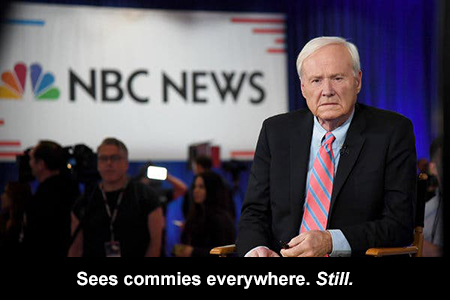On various occasions over the past week or two I’ve felt like I was tele-transported back into the mid-twentieth century. It started with MSNBC host Chris Mathews during a broadcast in New Hampshire spouting some crazy-ass rant about revolutionaries from Castro’s Cuba executing him in Central Park as American leftists – including Bernie Sanders – looked on approvingly. He later went full retrograde pundit, comparing Sanders’ victory in Nevada to the Nazis overrunning French defenses at the start of World War II. Then, this past week, Bernie Sanders’s comments about literacy programs in Cuba somehow became a central issue in the Democratic primary campaign, hoisted high by the “liberal” cable outlet MSNBC as evidence of Bernie’s unelectability and nefarious socialistic tendencies. The crew on Morning Joe jokingly addressed one another as “comrade”, jumping up and down on Sanders for being a Castro apologists, then – practically in the same breath – remembered the late dictator Hosni Mubarak as a source of stability in a troubled region. Can’t. make. it. up.

Now mind you, it isn’t like the MSNBC crew (and others) needed to resort to fighting the last war to properly bash Bernie. Their hair was on fire in the wake of Nevada particularly, and they are using what influence they have to trip him up in South Carolina, where their peculiar favorite Biden is favored to win. But resort they did, and in so doing, they (with some notable exceptions) revealed just how steeped in right-wing historical narratives their correspondents remain. I expect nothing better from Scarborough, a former right-wing congressman from Florida, but frankly one would hope that more than a handful of these journalists might acknowledge the neo-colonial relationship we’ve had with Caribbean and Central American nations over the past Century.
Comparing Cuba with the United States is a meaningless exercise. The former is a small, poor, underdeveloped country; the latter, a global superpower and the richest nation on Earth. A more apt comparison would be between Cuba and Guatemala or El Salvador, as these examples are also poor and underdeveloped, but remained in the U.S. sphere of influence, unlike Cuba post 1959. Compare literacy rates, the availability of health care, and other social goods, and trust me, Cuba is head and shoulders above the other two for the vast majority of their respective populations, despite Cuba having endured a crushing U.S. embargo (in addition to all-out terror) since its revolution sixty years ago. It’s also worth remembering that Cuba stood firmly on the side of Angola and the ANC throughout the 1970s and 1980s, when we were actively supporting apartheid South Africa. That’s why Raul Castro was honored so lavishly at Nelson Mandela’s funeral – they, more than any other nation, brought about the end of apartheid, and it cost them dearly.
I think Majority Report’s Michael Brooks had it right on Wednesday when he said that, given Cuba’s status as a cash-starved country under sustained attack for six decades, we could be excused for not obsessing over its authoritarian tendencies when we’re perpetually giving a nearly free pass to powerful, massively abusive authoritarian countries like China (as Bloomberg and CBS debate moderators did this past Tuesday).
luv u,
jp
